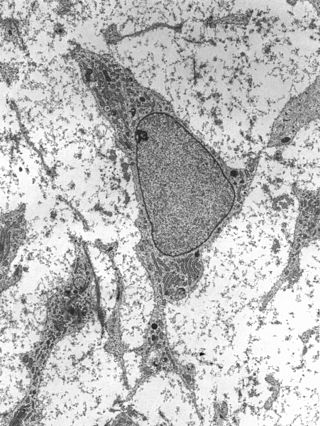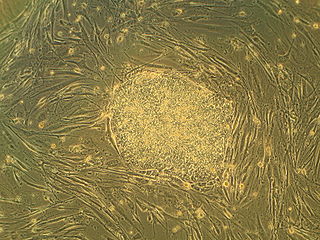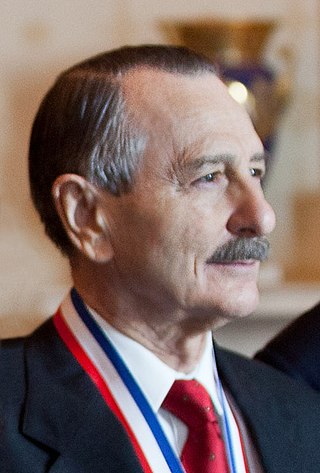
In multicellular organisms, stem cells are undifferentiated or partially differentiated cells that can change into various types of cells and proliferate indefinitely to produce more of the same stem cell. They are the earliest type of cell in a cell lineage. They are found in both embryonic and adult organisms, but they have slightly different properties in each. They are usually distinguished from progenitor cells, which cannot divide indefinitely, and precursor or blast cells, which are usually committed to differentiating into one cell type.

The University of Texas Southwestern Medical Center is a public academic health science center in Dallas, Texas. With approximately 23,000 employees, more than 3,000 full-time faculty, and nearly 4 million outpatient visits per year, UT Southwestern is the largest medical school in the University of Texas System and the State of Texas.

The Temerty Faculty of Medicine is the medical school of the University of Toronto. Founded in 1843, the faculty is based in Downtown Toronto and is one of Canada's oldest institutions of medical studies, being known for the discovery of insulin, stem cells and the site of the first single and double lung transplants in the world.

Embryonic stem cells (ESCs) are pluripotent stem cells derived from the inner cell mass of a blastocyst, an early-stage pre-implantation embryo. Human embryos reach the blastocyst stage 4–5 days post fertilization, at which time they consist of 50–150 cells. Isolating the inner cell mass (embryoblast) using immunosurgery results in destruction of the blastocyst, a process which raises ethical issues, including whether or not embryos at the pre-implantation stage have the same moral considerations as embryos in the post-implantation stage of development.

Regenerative medicine deals with the "process of replacing, engineering or regenerating human or animal cells, tissues or organs to restore or establish normal function". This field holds the promise of engineering damaged tissues and organs by stimulating the body's own repair mechanisms to functionally heal previously irreparable tissues or organs.
The Ottawa Hospital Research Institute (OHRI), formerly Ottawa Health Research Institute, is a non-profit academic health research institute located in the city of Ottawa. It was formed in 2001 following the merger of three Ottawa hospitals. The Ottawa Hospital Research Institute is the research arm of The Ottawa Hospital and affiliated with the University of Ottawa.

Anthony Atala is an American bioengineer, urologist, and pediatric surgeon. He is the W.H. Boyce professor of urology, the founding director of the Wake Forest Institute for Regenerative Medicine, and the chair of the Department of Urology at Wake Forest School of Medicine in North Carolina. His work focuses on the science of regenerative medicine: "a practice that aims to refurbish diseased or damaged tissue using the body's own healthy cells".
The Australian Regenerative Medicine Institute (ARMI) is an Australian medical research institute. Opened in April 2009, the institute is based at the Clayton campus of Monash University, in the Monash Science Technology Research and Innovation Precinct.

Ralph Lawrence Brinster is an American geneticist, National Medal of Science laureate, and Richard King Mellon Professor of Reproductive Physiology at the School of Veterinary Medicine, University of Pennsylvania.

Janet Rossant, is a developmental biologist well known for her contributions to the understanding of the role of genes in embryo development. She is a leader in developmental biology. Her current research interests focus on stem cells, molecular genetics, and developmental biology. Specifically, she uses cellular and genetic manipulation techniques to study how genes control both normal and abnormal development of early mouse embryos. Rossant has discovered information on embryo development, how multiple types of stem cells are established, and the mechanisms by which genes control development. In 1998, her work helped lead to the discovery of the trophoblast stem cell, which has assisted in showing how congenital anomalies in the heart, blood vessels, and placenta can occur.
The Canadian Stem Cell Foundation is an independent, non-profit organization established in 2008 and situated in Ottawa, Ontario. Stem Cell science is a Canadian innovation through the discovery of stem cells by Drs. James Till and Ernest McCulloch. It is globally known as the leading organization for stem cell research and support in the study of treatments and cures for diseases such as cancer, diabetes, blindness and stroke.
Peter Henry St George-Hyslop is a British and Canadian medical scientist, neurologist and molecular geneticist who is known for his research into neurodegenerative diseases. St George-Hyslop is one of the most cited authors in the field of Alzheimer's disease research. He has identified a number of key genes that are responsible for nerve cell degeneration and early-onset forms of Alzheimer's disease. These include the discovery of the presenilins, Nicastrin, TREM2, Apolipoprotein E and SORL1 genes. Presenilin mutations are the most common cause of familial Alzheimer's disease. St George-Hyslop also co-led the discovery of the gene for the amyloid precursor protein.

The Centre for Regenerative Medicine (CRM) is a stem cell research centre at the University of Edinburgh in Scotland, dedicated to the study and development of new regenerative treatments for human diseases. The centre forms part of the university's Institute for Regeneration and Repair and is part of the BioQuarter cluster at Little France.
Gordon M. Keller is a Canadian scientist recognized for his research on applying developmental biology findings to in vitro pluripotent stem cell differentiation. He is currently a Senior Scientist at the Ontario Cancer Institute, a Professor at the University of Toronto and the director of the McEwen Centre for Regenerative Medicine.

Jan A. Nolta is an American scientist and the director of the stem cell program at the UC Davis School of Medicine and Institute for Regenerative Cures. She is Scientific Director for the UC Davis Good Manufacturing Practice and editor of the journal Stem Cells. Nolta is known for her work with stem cell-related regenerative medicine. Nolta's current research focuses on treatment of Huntington's disease using mesenchymal stem cells. She was elected a AAAS Fellow in 2013.
Michael Fehlings is a Canadian neurosurgeon based at Toronto Western Hospital in Toronto, Ontario, Canada. Dr. Fehlings specializes in complex spine surgery with a special interest in traumatic and non-traumatic spinal cord injury and spine oncology. He mainly focuses on preclinical and clinical translational research related to enhancing repair and regeneration of the injured central nervous system. He holds many positions, including Professor of Neurosurgery at the University of Toronto, Vice Chair Research at the University of Toronto, Robert Campeau Foundation/Dr. C.H. Tator Chair in Brain and Spinal Cord Research at UHN, Scientist at the McEwen Centre for Regenerative Medicine, McLaughlin Scholar in Molecular Medicine, and Co-Director of the University of Toronto Spine Program. He is the past inaugural Director of the University of Toronto Neuroscience Program, and was the previous Medical Director at Toronto Western Hospital. Dr. Fehlings is a Fellow of the American College of Surgeons and a Fellow of the Royal College of Surgeons of Canada.

Derrick J. Rossi, is a Canadian stem cell biologist and entrepreneur. He is a co-founder of the pharmaceutical company Moderna.

Shruti Naik is an Indian American scientist who is known for her interdisciplinary research in immunology and adult stem cell biology. She is an Associate Professor of Dermatology, Immunology and Immunotherapy, and Institute of Regenerative Medicine and Director of the Tissue Repair Program at Icahn School of Medicine at Mount Sinai. Her lab combines approaches from the fields of immunology, microbiology, stem cell biology, and cancer biology with cutting-edge imaging and sequencing technologies to discover new ways of treating inflammatory diseases.
Farshid Guilak is an American engineer and orthopedic researcher. He is the Mildred B. Simon Professor of Orthopaedic Surgery at Washington University in St. Louis and director of research at Shriners Hospitals for Children. He is also on the faculty of the departments of Biomedical Engineering, Mechanical Engineering & Materials Science, and Developmental Biology at Washington University.
Jeffrey L. Wrana is a Canadian cancer researcher. He is the CIBC Breast Cancer Research Scientist and Mary Janigan Research Chair in Molecular Cancer Therapeutic at Mount Sinai Hospital and University of Toronto. As a Tier 1 Canada Research Chair in Medical Genetics and Microbiology at U of T, Wrana was elected a Fellow of the Royal Society of Canada.











